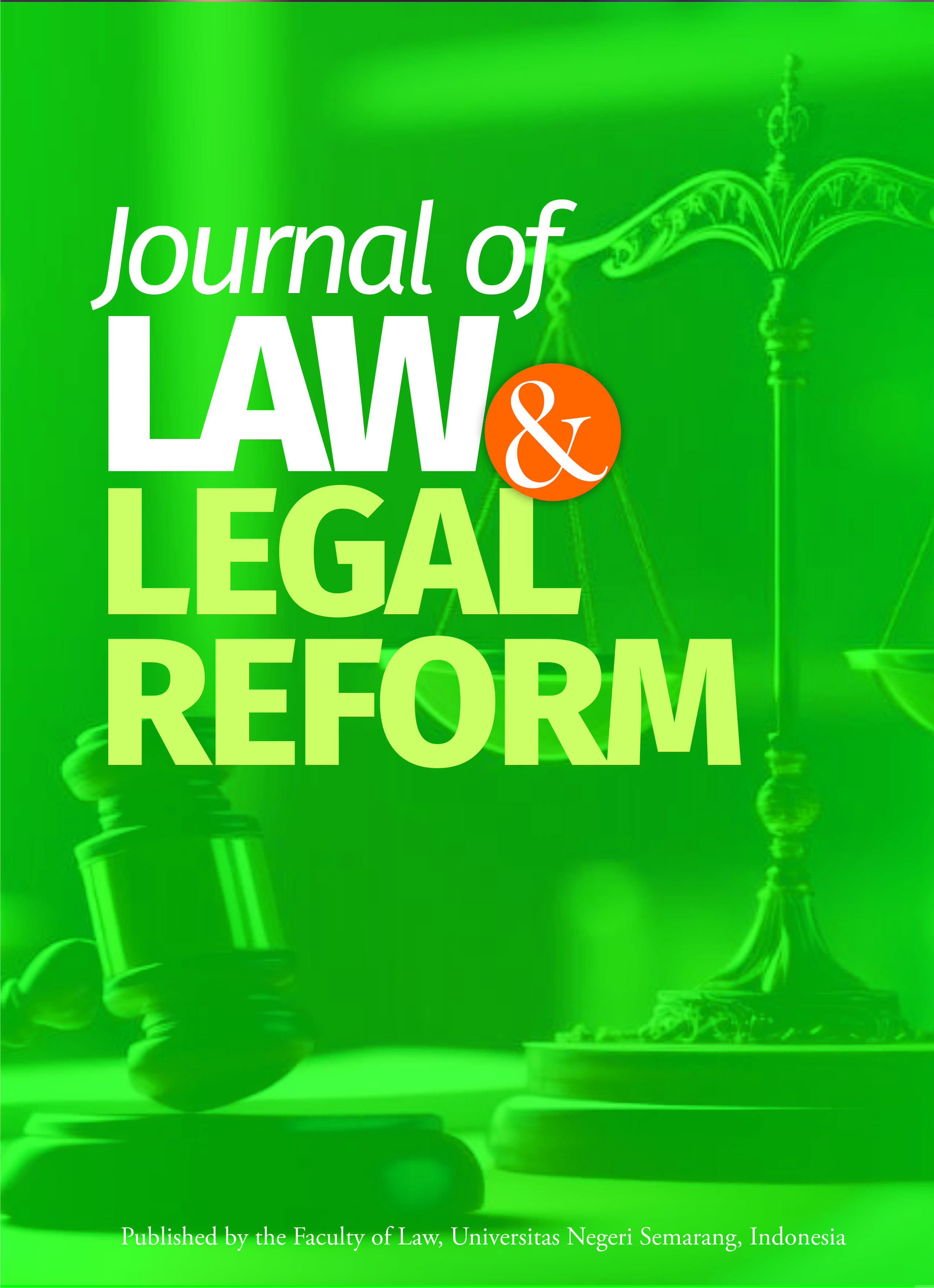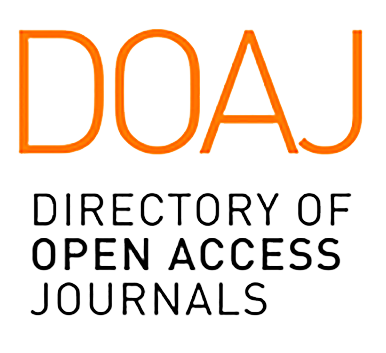Legal Reform of Artificial Intelligence's Liability to Personal Data Perspectives of Progressive Legal Theory
DOI:
https://doi.org/10.15294/jllr.vol5i2.3437Keywords:
Legal Responsibility, Artificial Intelligence, Personal Data, Progressive Legal TheoryAbstract
Advances in technology help people carry out their activities more easily. One of them is artificial intelligence which is used in various fields. However, the use of Artificial Intelligence has a negative impact, such as the emergence of Artificial Intelligence actions that violate ethics, legal regulations, or harm other parties that must be accounted for. The purpose of the research is to find out the legal liability of Artificial Intelligence for misuse of personal data based on progressive legal theory and the protection of personal data against the use of Artificial Intelligence based on Law Number 27 of 2022. The research method used normative legal research focuses on active legal inventories, legal principles and doctrines, legal discovery in specific cases, legal systems, levels of uniformity, comparative law and legal history. The research found that the use of Artificial Intelligence in collecting and analysing personal data can threaten individual privacy. Indonesia already has Law Number 27 of 2022 concerning Personal Data Protection, for the application and implementation of the law there is no governing Government Regulation, so that the legal protection provided is still not optimal. For this reason, it is necessary to have laws and regulations that specifically regulate the use of Artificial Intelligence, so that violations of the law that result in losses due to the use of Artificial Intelligence that can collect and analyse personal data can be held legally responsible.
References
Abbot, Ryan. “I Think, Therefore I Invent: Creative Computers and the Future of Patent Law”, Boston College Law Review 57, no. 4, (2016): 1079-1126, https://dx.doi.org/10.2139/ssrn.2727884
Amboro, FL. Yudhi Priyo and Khusuf Komarhana, “Prospek Kecerdasan Buatan sebagai Subjek Hukum Perdata di Indonesia”, Jurnal Law Review 21, no. 2 (2021): 145-172.
Amrizal, Victor and Qurrotul Aini, Kecerdasan Buatan, (Jakarta: Moeka Publishing, 2014).
Apodaca, Clair. “The Rule of Law and Human Rights”, Journal Judicature 87, no. 6, (2004): 292-299.
Atabekov, A. and O. Yastrebov, “Legal Status of Artificial Intelligence Across Countries: Legislation on the Move”, European Research Studies Journal 21, no. 4, (2018): 773-782, https://dx.doi.org/10.35808/ersj/1245
Bocharov, V.V. “Power and Taboo: On the Cultural-Psychological Sources of Traditionalism”, Journal Cultural-Historical Psychology 13, no. 4, (2017): 109:117, http://dx.doi.org/10.17759/chp.2017130412
Budhijanto, Danrivanto. “The Present and Future of Communication and Information Privacy in Indonesia”, Jurnal Hukum Internasional Universitas Padjadjaran 2, no. 2 (2003): 140.
Cerka, Paulius, Jurgita Grigiene, and Gintare Sirbikyte, “Liability for Damages Caused by Artificial Intelligence”, Computer and Law Security Review 31, no. 3 (2015): 376-389, https://doi.org/10.1016/j.clsr.2015.03.008
Chinen, Mark. “Chapter 6: AI and International Law”, in Monograph Book the International Governance of Artificial Intelligence, (June 2023), 178-202, https://doi.org/10.4337/9781800379220.00013
D.P., Iskandar. “Benarkah Perusahaan Bertanggung Jawab Atas Kesalahan Pekerjanya?”, https://bplawyers.co.id/2017/08/28/benarkah-perusahaan-bertanggung-jawab-atassemua-kesalahan-pekerjanya/, Accessed on 20 November 2023
Dewi, Sinta. Aspek Perlindungan Data Pribadi Menurut Hukum Internasional, Regional dan Nasional, (Bandung: Refika Aditama, 2015), pp. 12-15.
Djafar, Wahyudi. “Hukum Perlindungan Data Pribadi di Indonesia: Lanskap, Urgensi, Dan Kebutuhan Pembaharuan”, Online at https://referensi.elsam.or.id/wp-content/uploads/2020/04/hukum-perlindungan-data-pribadi-di-indonesia-wahyudi-djafar.pdf, accessed on 26 november 2023
Dwork, Cynthia, Frank McSherry, Kobbi Nissim and Adam Smith, “Calibrating Noise to Sensitivity in Private Data Analysis”, Journal of Privacy and Confidentiality 7, no. 3 (2016): 17-51, https://doi.org/10.29012/jpc.v7i3.405
Elnizar, Normand Edwin. “Perlindungan Data Pribadi Tersebar di 32 UU, Indonesia Perlu Regulasi Khusus”, https://www.hukumonline.com/berita/baca/lt5d1c3962e01a4/perlindungan-data-pribadi-tersebar- di-32-uu--indonesia-perlu-regulasi-khusus/, Accessed on 10 November 2023
Ernst, C. “Artificial Intelligence and Autonomy: Self-Determination in the Age of Automated Systems”. In: Wischmeyer, T., Rademacher, T. (eds.) Regulating Artificial Intelligence (Cham: Springer, 2020), pp. 53-73, http://dx.doi.org/10.1007/978-3-030-32361-5_3
Fachrizal, Rafki. “Apa Itu Teknologi Artificial Intelligence?”, 7 September 2021, https://infokomputer.grid.id/read/122878703/apa-itu-teknologi-artificial-intelligence?page=all, Accessed on 10 November 2023
Fatimah, Fines and Barda Nawawi Arief, “Pertanggungjawaban Pengganti (Vicarious Liability) dalam Kebijakan Formulasi Hukum Pidana di Indonesia”, Jurnal Law Reform 7, no. 2 (2012): 1-42, https://doi.org/10.14710/lr.v7i2.12408
Ghazmi, Shabrina Fadiah. “Urgensi Pengaturan Artificial Intelligence pada Sektor Bisnis Daring di Indonesia”, Rewang Rencang: Jurnal Hukum Lex Generalis 2, no. 8 (2021): 782-803, https://doi.org/10.23920/jbmh.v6i2.355
Gilani, Syed Hassan, et.al, “Artificial Intelligence and The Rule of Law: A Critical Appraisal of a Developing Sector”, Pakistan Journal of Social Research 5, no.2 (2023): 743-750, http://dx.doi.org/10.52567/pjsr.v5i02.1156
Hawking, Stephen. “Will Artificial Intelligence Outsmart Us?” https://www.amazon.com/Will-Artificial-Intelligence-Outsmart-Us/dp/1529392403, Accessed on 20 November 2023
Jaya, Febri and Wilton Goh, “Analisis Yuridis terhadap Kedudukan Kecerdasan Buatan atau Artificial Intelligence sebagai Subjek Hukum pada Hukum Positif Indonesia”, Jurnal Supremasi Hukum 17, no. 2 (2021): 1-11, https://doi.org/https://doi.org/10.33592/jsh.v17i2.1287
Justia.com, Vicarious Liability/Respondeat Superior, https://www.justia.com/injury/negligence-theory/vicarious-liability-respondeat-superior/, Accessed on 20 November 2023
Laptev, Vasiliy. “Artificial Intelligence and Liability for its Work”, Journal of the Higher School of Economics 2, no. 2, (2019): 79-102, http://dx.doi.org/10.17323/2072-8166.2019.2.79.102
Latumahina, Rosalinda Elsina. “Aspek Hukum Perlindungan Data Pribadidi Dunia Maya”, Jurnal Gema Aktualita 3, no. 2 (2014): 14-25, https://adoc.pub/aspek-hukum-perlindungan-data-pribadi-di-dunia-maya.html
Marzuki, Peter Mahmud. Penelitian Hukum, (Jakarta: Kencana, 2008).
Masrichah, Siti. “Ancaman dan Peluang Artificial Intelligence (AI)”, Khatulistiwa: Jurnal Pendidikan dan Sosial Humaniora 3, no. 3 (2023): 83-101, https://doi.org/10.55606/khatulistiwa.v3i3.1860
Minbaleev, A.V. “The Concept of "Artificial Intelligence" In Law”, Journal of Udmurt University Series Economics and Law 32, no. 6, (2022): 1094-1099, https://doi.org/10.35634/2412-9593-2022-32-6-1094-1099
Muhammad, Abdulkadir. Hukum dan Penelitian Hukum, (Bandung: Citra Aditya Bakti, 2004).
Muhtadi, Muhamad Ammar and Sahrul Sahrul, “Hukum Perlindungan Konsumen dan Etika Bisnis di Era Teknologi Kecerdasan Buatan: Perlindungan Pengguna dan Tanggung Jawab Perusahaan”, Jurnal Hukum dan HAM Wara Sains 2, no. 9 (2023): 922-930, https://doi.org/10.58812/jhhws.v2i09.674
Mulgan, Tim. “Corporate Agency and Possible Futures”, Journal of Business Ethics 154, no. 4, (2019): 901-916, http://dx.doi.org/10.1007/s10551-018-3887-1.
Muller, Vicent C. “Ethics of artificial intelligence”. In Elliott A. (ed.) The Routledge Social Science Handbook of AI: Part I: Social Science Approaches to Artificial Intelligence, (London: Routledge, 2021).
Noerman, Chiquita Thefirstly, and Rosalia Dika Agustanti, “Pertanggungjawaban Artificial Intellegent sebagai Subjek Hukum yang Melakukan Tindak Pidana Korupsi”, Jurnal Hukum Samudra Keadilan 18, no. 2 (2023): 388-405, https://doi.org/10.33059/jhsk.v18i2.8722
Oktallia, Vika and I Gede Putra Ariana, “Perlindungan terhadap Korban Penyalahgunaan Teknik Deepfake terhadap Data Pribadi”, Jurnal Kertha Desa 10, no. 11 (2022): 1252-1263, https://ojs.unud.ac.id/index.php/kerthadesa/article/view/93672
Pearce, Graham and Nicholas Platten, “Achieving Personal Data Protection in The European Union”, Journal of Common Market Studies 36, no. 4 (2002): 529-547, https://doi.org/10.1111/1468-5965.00138
Priscyllia, Fanny. “Perlindungan Privasi Data Pribadi Perspektif Perbandingan Hukum”, Jurnal Jatiswara 34, no. 3 (2019): 239-249, https://jatiswara.unram.ac.id/index.php/js/article/view/218
Rahardjo, Satjipto. “Arsenal Hukum Progresif”, Jurnal Hukum Progresif 3, no. 1 (2007): 1, https://doi.org/10.14710/hp.3.1.1
Rahardjo, Satjipto. Hukum Progresif Sebagai Dasar Pembangunan Ilmu Hukum, dalam buku Menggagas Hukum Progresif Indonesia, (Semarang: Kerjasama Pustaka Pelajar, IAIN Walisongo dan Program Doktor Ilmu Hukum UNDIP, 2006).
Rahardjo, Satjipto. Hukum Progresif. (Yogyakarta: Genta Press, 2009).
Rahardjo, Satjipto. Hukum Progresif: Sebuah Sintesa Hukum Indonesia, (Yogyakarta: Genta Publishing, 2009).
Rahardjo, Satjipto. Negara Hukum yang Membahagiakan Rakyatnya, (Yogyakarta: Genta Publishing, 2009).
Rahman, Faiz. “Kerangka Hukum Perlindungan Data Pribadi dalam Penerapan Sistem Pemerintahan Berbasis Elektronik di Indonesia”, Jurnal Legislasi Indonesia 18, no. 1 (2021): 81-102, https://doi.org/10.54629/jli.v18i1.736
Ramadhan, Hakim Agung and Dinita Andriani Putri, Big Data, Kecerdasan Buatan, Blockchain, dan Teknologi Finansial di Indonesia: Usulan Desain, Prinsip, dan Rekomendasi Kebijakan, (Jakarta: Kajian CIPG untuk Direktorat Jenderal Aplikasi Informatika Kementerian Komunikasi dan Informatika Republik Indonesia, Centre for Innovation Policy and Governance (CIPG), 2018).
Ravizki, Eka Nanda and Lintang Yudhantaka, “Artificial Intelligence sebagai Subjek Hukum: Tinjauan Konseptual dan Tantangan Pengaturan di Indonesia”, Jurnal Notaire 5, no. 3 (2022): 351–376, https://doi.org/10.20473/ntr.v5i3.39063
Ravlindo, Endison and Ariawan Gunadi, “Perlindungan Hukum terhadap Data Kesehatan melalui Pengesahan Rancangan Undang-Undang Perlindungan Data Pribadi”, Jurnal Hukum Adigama 4, no. (2021): 4748-4769, https://journal.untar.ac.id/index.php/adigama/article/view/18028/9994
Rhim, Young-Yik and Kyung Bae Park, “The Artificial Intelligence in International Law”, Book Chapter Revolutionary Approach to International Law, (2023): 215-237, https://doi.org/10.1007/978-981-19-7967-5_11
Ririh, Kirana Rukmayuninda, et al., 2020, “Studi Komparasi dan Analisis Swot pada Implementasi Kecerdasan Buatan (Artificial Intelligence) di Indonesia”, Jati Undip: Jurnal Teknik Industri 15, no. 2 (2020): 122-133, https://doi.org/doi.org/10.14710/jati.15.2.122-133
Rizki, Miyuki Fattah and Abdul Salam, “Pertanggungjawaban Hukum Pengumpulan Data Biometrik Melalui Artificial Intelligence Tanpa Persetujuan Pemilik Data (Studi Kasus Clearview AI Inc. di Yunani dan Inggris)”, Jurnal Le Patrimonium 2, no. 2 (2023): 1-16, https://scholarhub.ui.ac.id/lexpatri/vol2/iss2/9/
Samusevich, A.G. “Digital Law Enforcement: Theory and Practice”. Siberian Law Herald 4, no. 99, (2022): 22-28, http://dx.doi.org/10.26516/2071-8136.2022.4.22
Simons, Penelope and Melisa Handl, “Relations of Ruling: A Feminist Critique of The United Nations Guiding Principles on Business and Human Rights and Violence Against Women in the Context of Resource Extraction”, Canadian Journal of Women and the Law 34, no. 1, (2022): 113-150, http://dx.doi.org/10.3138/cjwl.31.1.06
Skorobogatov, Andrey V. and Alexandr V. Krasnov, “Law Nature of Artificial Intelligence”, Journal Problems of Information Society 14, no. 1 (2023): 3-13, http://doi.org/10.25045/jpis.v14.i1.01
Sulistianingsih, Dewi, et.al, “Tata Kelola Perlindungan Data Pribadi di Era Metaverse (Telaah Yuridis Undang-Undang Perlindungan Data Pribadi)”, Jurnal Masalah-Masalah Hukum 52, no. 1 (2023): 97-106, https://doi.org/10.14710/mmh.52.1.2023.97-106
Taddeo, Mariarosario and Luciano Floridi, “How AI Can Be a Force for Good”, Perspective Artificial Intelligence 361, no. 6404, (2018): 751-752, https://doi.org/10.1126/science.aat5991
Tejomurti, Kukuh, et.al, “Legal Protection for Urban Online-Transportation-User’s Personal Data Disclosure in the Age of Digital Technology”, Padjadjaran Journal of Law 5, no. 3 (2018): 485-505, https://doi.org/10.22304/pjih.v5n3.a5%0D
van Zoonen, Liesbet. “Data Governance and Citizen Participation in The Digital Welfare State”, Data & Policy 2, no.10 (2020): 1-17, https://doi.org/10.1017/dap.2020.10
Yildrim, Soner. “Data Leakage in Machine Learning”, https://towardsdatascience.com/data-leakage-in-machine-learning-6161c167e8ba, Accessed on 20 November 2023
Downloads
Published
Article ID
3437Issue
Section
License
Copyright (c) 2024 Junaidi Junaidi, Pujiono Pujiono, Rozlinda Mohamed Fadzil (Author)

This work is licensed under a Creative Commons Attribution-NonCommercial-ShareAlike 4.0 International License.
All writings published in this journal are personal views of the authors and do not represent the views of this journal and the author's affiliated institutions. Author(s) retain copyrights under a Creative Commons Attribution-NonCommercial-ShareAlike 4.0 International (CC BY-NC-SA 4.0).









